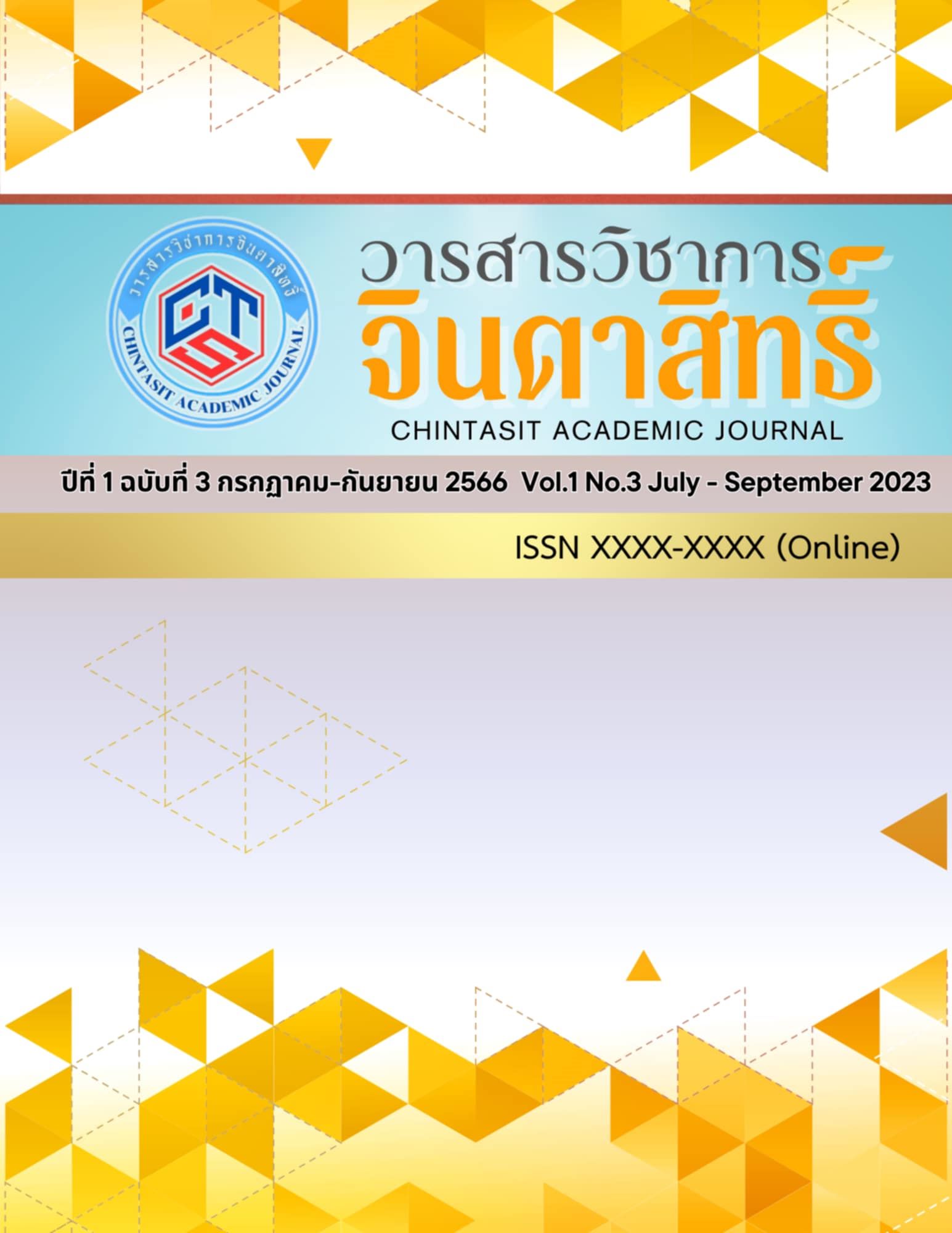จริยธรรมในยุคปัญญาประดิษฐ์: การเตรียมนักเรียนสำหรับอนาคต
Main Article Content
บทคัดย่อ
บทความนี้นำเสนอแนวทางการเตรียมความพร้อมด้านจริยธรรมสำหรับนักเรียนในยุคปัญญาประดิษฐ์ (AI) โดยมุ่งเน้นการพัฒนาทักษะการคิดวิเคราะห์ ความเข้าใจในผลกระทบของ AI และความสามารถในการตัดสินใจเชิงจริยธรรม บทความอภิปรายถึงความสำคัญของการบูรณาการจริยธรรม AI ในหลักสูตรการศึกษา แนวทางการสอน และความท้าทายที่อาจเกิดขึ้น พร้อมทั้งเสนอแนะวิธีการประเมินผลและการพัฒนาทักษะที่จำเป็นสำหรับอนาคต นอกจากนี้ ยังเน้นย้ำถึงความสำคัญของความร่วมมือระหว่างภาคการศึกษา ภาคอุตสาหกรรม และภาครัฐในการพัฒนาหลักสูตรที่ตอบสนองต่อความต้องการของสังคมในยุคดิจิทัล บทความสรุปด้วยการเสนอแนะแนวทางการสร้างสังคมที่ AI และมนุษย์สามารถอยู่ร่วมกันได้อย่างสร้างสรรค์และยั่งยืน
Article Details

อนุญาตภายใต้เงื่อนไข Creative Commons Attribution-NonCommercial-NoDerivatives 4.0 International License.
วารสารวิชาการจินตาสิทธิ์ อยู่ภายใต้การอนุญาต Creative Commons Attribution-NonCommercial-NoDerivatives 4.0 International (CC BY-NC-ND 4.0) เว้นแต่จะระบุไว้เป็นอย่างอื่น โปรดอ่านหน้านโยบายของเราสำหรับข้อมูลเพิ่มเติมเกี่ยวกับการเข้าถึงแบบเปิด ลิขสิทธิ์ และการอนุญาต
เอกสารอ้างอิง
ชัยวัฒน์ วิบูลย์สวัสดิ์. (2565). การพัฒนารายวิชาจริยธรรม AI สำหรับนักเรียนระดับมัธยมศึกษา. วารสารวิทยาการการจัดการ, 39(1), 45-62.
ธนารักษ์ ธีระมั่นคง. (2563). ปัญญาประดิษฐ์กับการพัฒนาทรัพยากรมนุษย์ในยุคดิจิทัล. วารสารพัฒนาสังคม, 22(1), 1-21.
ธีรเกียรติ์ เกิดเจริญ. (2565). การพัฒนาทักษะการคิดเชิงวิพากษ์ในยุค AI. วารสารศึกษาศาสตร์ มหาวิทยาลัยนเรศวร, 24(2), 15-28.
ธีระ รุญเจริญ. (2565). ภาวะผู้นำทางการศึกษา: ทฤษฎีและการปฏิบัติ (พิมพ์ครั้งที่ 4). สำนักพิมพ์แห่งจุฬาลงกรณ์มหาวิทยาลัย.
ปริญญา หอมเอนก. (2562). จริยธรรมปัญญาประดิษฐ์: ความท้าทายในยุคดิจิทัล. วารสารนิติศาสตร์ มหาวิทยาลัยนเรศวร, 12(2), 1-24.
ปานใจ ธารทัศนวงศ์. (2564). การบูรณาการจริยธรรม AI ในหลักสูตรการศึกษาไทย. วารสารครุศาสตร์อุตสาหกรรม, 20(1), 1-15.
รุ่งชัชดาพร เวหะชาติ. (2564). การบริหารสถานศึกษาในยุคดิจิทัล (พิมพ์ครั้งที่ 3). นำศิลป์โฆษณา.
วรรณดี สุทธินรากร. (2562). ภาวะผู้นำของผู้บริหารสตรีในสถานศึกษา: กรณีศึกษาโรงเรียนมัธยมศึกษาในกรุงเทพมหานคร. วารสารการบริหารการศึกษา มหาวิทยาลัยศิลปากร, 10(1), 156-170.
วิทยา ด่านธำรงกูล. (2564). การพัฒนาทักษะการตัดสินใจเชิงจริยธรรมในยุค AI. วารสารบริหารธุรกิจ, 44(169), 1-22.
วิโรจน์ สารรัตนะ. (2564). ภาวะผู้นำทางการศึกษา: แนวคิด ทฤษฎี และประเด็นเพื่อการวิจัย (พิมพ์ครั้งที่ 3). ทิพยวิสุทธิ์.
ศศิธร บัวทอง. (2562). การพัฒนาภาวะผู้นำของผู้บริหารสตรีในสถานศึกษาขั้นพื้นฐาน. วารสารศึกษาศาสตร์ มหาวิทยาลัยนเรศวร, 21(3), 290-304.
สำนักงานคณะกรรมการการศึกษาขั้นพื้นฐาน. (2563). รายงานประจำปี 2563. ผู้แต่ง.
สุภาพ ฉัตราภรณ์. (2563). การศึกษาความสามารถในการบริหารงานของผู้บริหารสตรีในสถานศึกษาสังกัดสำนักงานเขตพื้นที่การศึกษามัธยมศึกษา เขต 1. วารสารวิชาการศึกษาศาสตร์ มหาวิทยาลัยศรีนครินทรวิโรฒ, 21(1), 92-105.
สุภาพร พงศ์ภิญโญโอภาส. (2563). ปัจจัยที่ส่งผลต่อความสำเร็จในการบริหารสถานศึกษาของผู้บริหารสตรี. วารสารการบริหารการศึกษาและภาวะผู้นำ มหาวิทยาลัยราชภัฏสกลนคร, 8(31), 223-237.
สุมาลี ละม่อม. (2563). รูปแบบการพัฒนาภาวะผู้นำของผู้บริหารสตรีในสถานศึกษาขั้นพื้นฐาน. วารสารวิชาการและวิจัยสังคมศาสตร์, 15(3), 25-40.
สุรศักดิ์ ปาเฮ. (2564). การจัดการศึกษาด้านจริยธรรม AI ในประเทศไทย: สถานการณ์และความท้าทาย. วารสารศึกษาศาสตร์ มหาวิทยาลัยนเรศวร, 23(4), 15-30.
Banks, J. A., & McGee Banks, C. A. (2019). Multicultural education: Issues and perspectives (10th ed.). Wiley.
Bennett, M. J. (2017). Developmental model of intercultural sensitivity. In Y. Y. Kim (Ed.), The international encyclopedia of intercultural communication (pp. 1-10). Wiley.
Blumenfeld, P. C., Soloway, E., Marx, R. W., Krajcik, J. S., Guzdial, M., & Palincsar, A. (1991). Motivating project-based learning: Sustaining the doing, supporting the learning. Educational Psychologist, 26(3-4), 369-398.
Bostrom, N., & Yudkowsky, E. (2014). The ethics of artificial intelligence. The Cambridge handbook of artificial intelligence, 316, 334.
Burton, E., Goldsmith, J., Koenig, S., Kuipers, B., Mattei, N., & Walsh, T. (2017). Ethical considerations in artificial intelligence courses. AI Magazine, 38(2), 22-34.
Cath, C., Wachter, S., Mittelstadt, B., Taddeo, M., & Floridi, L. (2018). Artificial intelligence and the 'good society': The US, EU, and UK approach. Science and Engineering Ethics, 24(2), 505-528.
Crocco, M. S., Segall, A., Halvorsen, A. L., & Jacobsen, R. (2018). Deliberating public policy issues with adolescents: Classroom dynamics and sociocultural considerations. Democracy and Education, 26(1), 3.
Dignum, V. (2018). Ethics in artificial intelligence: Introduction to the special issue. Ethics and Information Technology, 20(1), 1-3.
Floridi, L., Cowls, J., Beltrametti, M., Chatila, R., Chazerand, P., Dignum, V., ... & Vayena, E. (2018). AI4People—An ethical framework for a good AI society: Opportunities, risks, principles, and recommendations. Minds and Machines, 28(4), 689-707.
Grover, S., Basu, S., Bienkowski, M., Eagle, M., Diana, N., & Stamper, J. (2020). A framework for using hypothesis-driven approaches to support data-driven learning analytics in measuring computational thinking in block-based programming environments. ACM Transactions on Computing Education (TOCE), 20(2), 1-25.
Holmes, W., Bialik, M., & Fadel, C. (2019). Artificial intelligence in education: Promises and implications for teaching and learning. Center for Curriculum Redesign.
Holstein, K., McLaren, B. M., & Aleven, V. (2019). Co-designing a real-time classroom orchestration tool to support teacher–AI complementarity. Journal of Learning Analytics, 6(2), 27-52.
Makridakis, S. (2017). The forthcoming Artificial Intelligence (AI) revolution: Its impact on society and firms. Futures, 90, 46-60.
Park, Y. (2019). DQ Global Standards Report 2019: Common Framework for Digital Literacy, Skills and Readiness. DQ Institute.
Pearce, T. C., Zaki, M., Brintrup, A., & Neely, A. (2019). High-Value Manufacturing: Capability, Appropriation, and Governance. California Management Review, 61(4), 115-135.
Pedaste, M., Mäeots, M., Siiman, L. A., De Jong, T., Van Riesen, S. A., Kamp, E. T., ... & Tsourlidaki, E. (2015). Phases of inquiry-based learning: Definitions and the inquiry cycle. Educational Research Review, 14, 47-61.
Stone, P., Brooks, R., Brynjolfsson, E., Calo, R., Etzioni, O., Hager, G., ... & Teller, A. (2016). Artificial intelligence and life in 2030: One hundred year study on artificial intelligence. Stanford University.
Touretzky, D., Gardner-McCune, C., Martin, F., & Seehorn, D. (2019). Envisioning AI for K-12: What should every child know about AI? Proceedings of the AAAI Conference on Artificial Intelligence, 33(1), 9795-9799.
von Schomberg, R., & Hankins, J. (Eds.). (2019). International handbook on responsible innovation: A global resource. Edward Elgar Publishing.
Winfield, A. (2019). Ethical standards in robotics and AI. Nature Electronics, 2(2), 46-48.
Winfield, A. F., Michael, K., Pitt, J., & Evers, V. (2019). Machine ethics: The design and governance of ethical AI and autonomous systems. Proceedings of the IEEE, 107(3), 509-517.
Zuckerman, O., Gal-Oz, A., Tamir, N., & Kopelman-Rubin, D. (2021). Designing an experiential learning activity to develop ethical and professional skills in computer science and engineering education. Computer Science Education, 31(1), 77-105.


